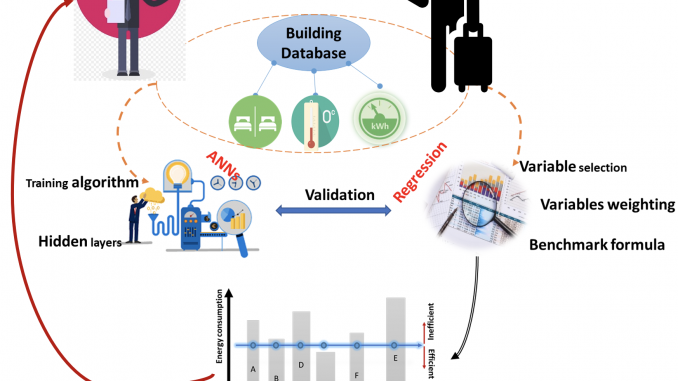
Haitham Kalaf
After great east earthquake 2011 in Japan, a dramatically change in energy policy of Japan has been done through set of new polices and regulations that aim to reduce the energy consumption in different sectors. Buildings sector was one of main target to achieve significant saving of energy since buildings are third high consumer after industrial and transportation sectors.
Accommodation building is a main component of hospitality industry especially when this country aims to improve its tourism sector or to host big event of the Olympic and Paralympic Games Tokyo 2020. In the same time, accommodation sector is energy intensive among other commercial buildings with significant potential to reduce energy consumption. Base on previous background, the research develops a benchmark tool to assess the energy performance of accommodation buildings in Kanto region to achieve better saving of energy consumption. Benchmark is an approach to compare the performance of energy use of a building with other peer buildings or its history. This research aims to illustrate the impact of different factors on energy consumption of target buildings. Choosing the effective variables will enhance better establishing of benchmark tool for energy assessment using regression model. This tool is the main target of current work to enable managers and owners of accommodation facilities to assess the performance. Finally, the study aims to validate the benchmarking results using Artificial Neural Networks (ANNs) to confirm the feasibility of benchmark tool for accommodation buildings.The investigation pointed out the correlation between physical and operation variable and energy consumption using statistical method. The regression model is a common approach to find out the impact of each variable on energy performance, clustering selected buildings is an essential procedure to classify buildings into groups before analyzing the energy performance.The regression model has been used as main approach to formulate the benchmark equation for each cluster, this equation illustrates the impact of each selected variable on the energy consumption for each cluster of accommodation buildings. AANs model have been used to validate the regression model after design ANNs model based on selecting best learning method and the optimum number of hidden layers.The study uses a national scale survey of energy use of commercial buildings under project Database for Energy Consumption of Commercial Buildings (DECC) from Japan Sustainable Building Consortium (JSBC), the investigation covers all classes of accommodation buildings in Kanto region from 2006 until 2012. A franchised hotel which is located in Kanto region, have been used to test benchmark outputs, energy consumption data for 5 years have been obtained for several building blocks in different location in Kanto region.Electricity, Gas and clean water was main variables to measure energy use intensity (EUI) using regression and ANNs models to benchmark the energy performance of accommodation building. These variables have been selected based on their clear correlation with primary energy consumption. The results introduced basic benchmark equations, which form a reference to assess the energy performance of accommodation buildings in Kanto region. The benchmark enables managers to run energy plan without affecting the satisfaction of users by understand the weight of the variables in benchmark equation. For instance, the current research shows the impact of using electricity is higher than gas usage. Therefore, shifting into gas consumption more than electricity will reduce EUI without compromising service quality for selected building. In the same time this result can be used to evaluate the economic performance or environmental performance by add more parameters which indicate the economic and environmental outputs.The study is considered as the first study which introduces a benchmarking of energy performance of accommodation buildings in Japan, there is no previous efforts to establish a benchmark reference for this category of buildings or other categories of commercial buildings. The research benefits existing data to set a simple benchmark as a reference for assessment the energy performance of accommodation buildings, the research point out to the necessity of set a benchmark for commercial buildings and more detailed benchmark for accommodation buildings because of its economic and environmental importance.ANNs model have been used as validation model but the current study designs the ANNs model to achieve accurate results through choosing learning algorithm and the number of hidden layers, other studies does not consider this issue which can affects the accuracy based on data size and the uncertainty of variables. The benchmark of this study supports improving the economic performance of buildings by reducing energy cost and improving the reputation of accommodation facility as sustainable building. The reduction of energy consumption will reduce the CO2 emission and using other natural resources that means better environmental performance. The research has social contribution through increasing awareness about energy saving, providing sustainable facilities that sustain quality level with less energy and natural resources. In addition, the study pointed out the importance of establishing benchmark tool for accommodation buildings or other commercial buildings. On the other hand, this benchmark enables manager to improve their buildings performance without reduce the comfort level as main function of accommodation buildings. The study emphasizes the necessity to design ANNs model to meet the data set of case study. Both of learning algorithm and hidden layers have been designed to fit the database of DECC.
Finally, the study paves the way for future studies to set detailed benchmark for accommodation buildings for Kanto region and national scale to depend it as powerful tool to assess the energy performance of target buildings.
- Alkhalaf, H., & Yan, W. (2017). A study on the Correlation between the Energy Use and Occupancy Rate of Accommodation Buildings. Internatioanal Journal of Academic Scientific Research, 5(2), 96–109.
-
Alkhalaf, H., & Yan, W. (2018). Modeling of Building Energy Consumption for Accommodation Buildings (Lodging Sector) in Japan—Case Study. Applied System Innovation, 1(4), 1–12. https://doi.org/10.3390/asi1040039
-
Alkhalaf, H., Ibrahim, M. N., & Yan, W. (2018). Numerical Study about Improvlng the ProflCiency of an Earth Air Heat Exchanger System (EAHE) Employing Ground Cover Material. Journal of Clean Energy Technology, 6(2), 106–111.